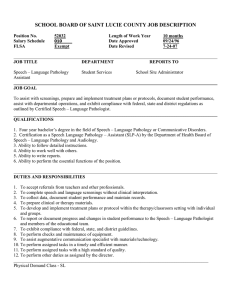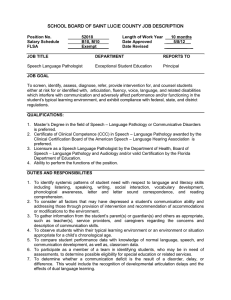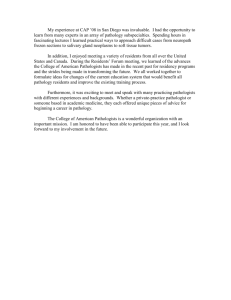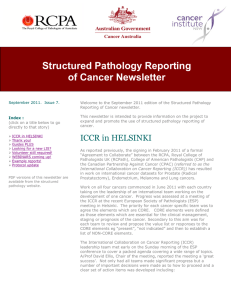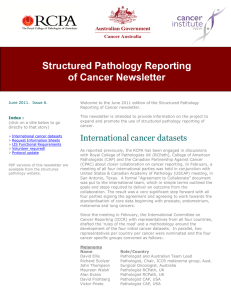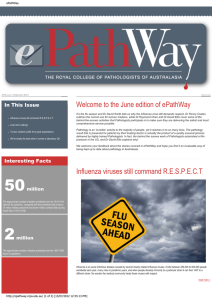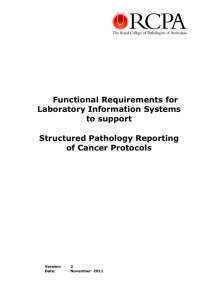A Career in Chemical Pathology
advertisement
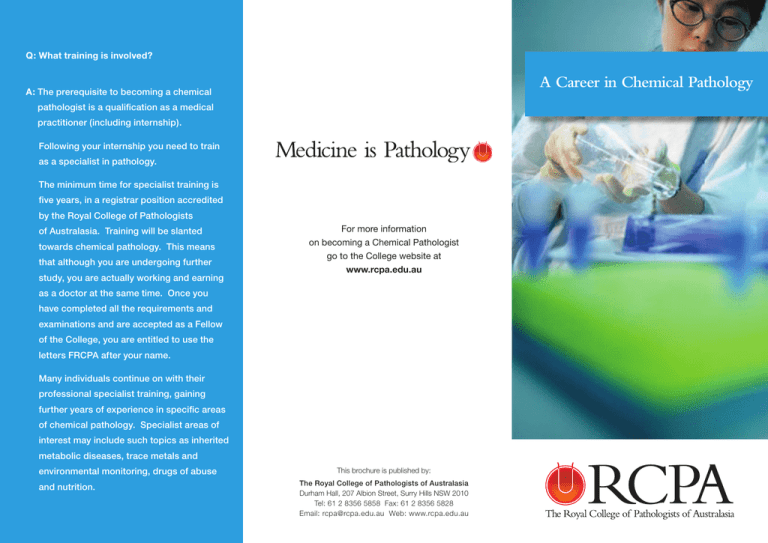
Q: What training is involved? A Career in Chemical Pathology A: The prerequisite to becoming a chemical pathologist is a qualification as a medical practitioner (including internship). Following your internship you need to train as a specialist in pathology. The minimum time for specialist training is five years, in a registrar position accredited by the Royal College of Pathologists of Australasia. Training will be slanted towards chemical pathology. This means that although you are undergoing further study, you are actually working and earning For more information on becoming a Chemical Pathologist go to the College website at www.rcpa.edu.au as a doctor at the same time. Once you have completed all the requirements and examinations and are accepted as a Fellow of the College, you are entitled to use the letters FRCPA after your name. Many individuals continue on with their professional specialist training, gaining further years of experience in specific areas of chemical pathology. Specialist areas of interest may include such topics as inherited metabolic diseases, trace metals and environmental monitoring, drugs of abuse and nutrition. This brochure is published by: The Royal College of Pathologists of Australasia Durham Hall, 207 Albion Street, Surry Hills NSW 2010 Tel: 61 2 8356 5858 Fax: 61 2 8356 5828 Email: rcpa@rcpa.edu.au Web: www.rcpa.edu.au Q: What personal characteristics does a Chemical Pathology Chemical Pathologist need? A: Varying combinations of the following traits: • strong aptitude for, and interest in, the scientific basis of medicine and laboratory work Q: What is Chemical Pathology? A: Chemical pathology/clinical biochemistry involves the study and investigation of the biochemical basis of disease processes with particular emphasis on metabolic diseases, which includes diabetes, bone disease, inborn errors and lipid disorders. Chemical pathology is arguably the broadest discipline in the field of pathology. • leadership potential is essential, as is clinical experience, and candidates should have the ability to mix and match their laboratory and clinical roles seamlessly • the use of information systems is an integral part of laboratory practice, particularly in chemical pathology, where large amounts of numeric data are analysed. Familiarity with information systems and data analysis is becoming a necessary skill in Q: What does a Chemical Pathologist do? A: Work encompasses the common investigations of electrolyte and diagnostic enzyme changes and this discipline Q: What are the advantages of being a Chemical Pathologist? A: As this discipline covers a diverse array of investigations and clinical areas, the role of a chemical pathologist can be hard to categorise at times. This, however, is a positive attribute, since the position can to some extent be made into what plasma proteins seen in routine clinical practice, an individual wants to pursue as a career. The day as well as endocrine testing, tumour markers, to day experience is also often unpredictable, and therapeutic drugs and toxicology. one can never be certain what clinical problem will The major part of a chemical pathologist’s day is typically spent in clinical liaison. This involves arise. For this reason, it is a discipline that continues to provide challenges and interest. advising clinicians about the appropriate tests for The discipline involves integration of laboratory investigation of a particular clinical problem, the and clinical medicine with good opportunities to interpretation of results and follow-up, and the effect of interference on test results. The working day has participate in clinical research. a large component devoted to the validation and The work load is interesting and on-call duties are interpretation of test results. not onerous and are usually conducted by phone.
